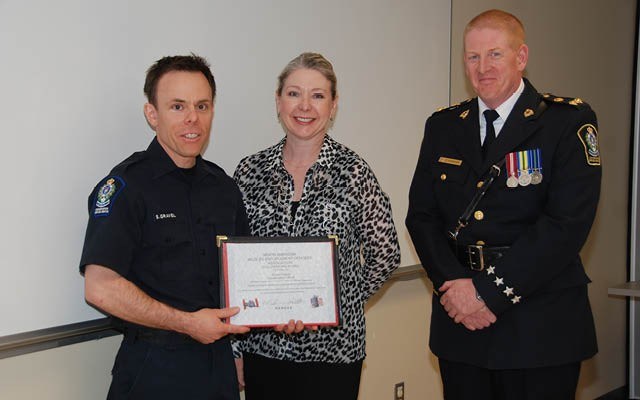A conservation officer who helped save a woman from drowning in the frigid waters of Howe Sound was honoured by the North American Wildlife Enforcement Officers Association (NAWEOA) last week — but doesn't want people to see him as a hero.
"It was not such a heroic event in that I went above and beyond my skills and risked my life to accomplish that rescue," said Simon Gravel, modestly. "We were there on duty at the right time and executed what we are trained to do."
The rescue happened in May of 2013 as Gravel was on a patrol boat with a work-experience student.
That's when he noticed a woman thrashing in the water between Porteau Cove and Britannia after falling off her standup paddleboard, which then floated out of reach. Without a floatation device, the woman struggled to keep her head above water. Gravel rushed to the scene, found her and pulled her from the sound. He immediately administered treatment for hypothermia, likely saving the woman's life.
He was honoured May 2 in a ceremony hosted by the B.C. Ministry of Environment, receiving NAWEO's Lifesaving Award.
The event also saw 10 other B.C. conservation officers recognized for their efforts in protecting the province's residents and natural resources.
The 39-year-old Gravel, who has been in the Conservation Officer Service (COS) for five years, two of those in Squamish, said one of the best things that came out of last year's rescue was the opportunity to raise awareness of the potential risks of standup paddle boarding, and to inform the public of the proper equipment and training it requires.
Long-time Sea to Sky conservation officer, and current inspector of south coast operations, Chris Doyle, was also recognized last week, receiving the Peace Officer Exemplary Service Medal from Environment Minister Mary Polak for his 21 years in the service.
Doyle has served as an officer in Sechelt and Squamish, and has organized wildlife conflict prevention and response programs across the province, helping three B.C. communities, including Whistler, achieve Bear Smart status.
"I'm proud to have received the honour and I'm proud of the work I've been able to do," Doyle said. "I'm so fortunate to have been able to live and work in a beautiful part of B.C. and contribute to protecting the environment and public safety."
During his extensive service career, Doyle said he was most proud of being able to work with various Sea to Sky stewardship groups, as well as his involvement in a number of high-profile cases, like the investigation into grizzly bear poaching in Pemberton that led to a provincial court judge sentencing Squamish's Brett Michael Eyber in October to pay $10,000 in fines and donations to a local wildlife fund. He also highlighted the work he's done in the resort to reduce wildlife conflicts.
"(I'm proud of) coming up with innovative ways to deal with black-bear conflicts in Whistler," he said. "It's always interesting and exciting, and you never know what you might see on any given day in Whistler with bears."
With the spring season now in full swing, the potential for bear conflict is high, and the COS is urging residents to take the necessary precautions in order to prevent incidents like the one that occurred last Thursday, May 2, when a male bear entered a residence in White Gold and was ultimately destroyed — the first bear killed by conservation officers this season.
"A bear had gone into an occupied house and got a food reward," said COS Sergeant Peter Busink, adding that an occupant managed to chase the bear out. "It also had two separate tags, indicating it had been captured and relocated on at least two different occasions prior to this."
Officers were unsure of the 350-pound bear's exact conflict history as the tags had deteriorated to a point where they were illegible, said Busink, who stressed that "the onus is on residents to manage their attractants.
"That means keeping their barbecues clean, taking their bird feeders down, and the most important thing is to ensure that their garbage is secured, that it's not left outside obviously, and if it is left inside, ensuring that it's somewhere secure."
Last Thursday also saw another bear break-in at a residence in Alpine, with RCMP members attending and hazing the bear from the site. The animal was gone by the time conservation officers arrived, and has not yet been located.
Busink reminded the public to report any wildlife conflicts at 1-877-952-7277 as soon as they take place.
"We request that people call early when conflicts start happening because that allows the conservation officer a lot more options in terms of intervention. That will give the bear the best possible chance at survival, whereas when people don't call or leave it too late, we run out of options to deal with the bear," he explained.
In Whistler, a total of three bears were destroyed between April 1, 2013 and March 31, 2014, according to COS figures.




